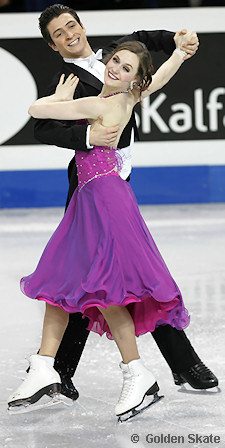The 2009 Four Continents Figure Skating Championships are being held Feb. 4-7 in Vancouver (BC), Canada at the Pacific Coliseum. It is the third time since 1999 that Canada has hosted this event. Approximately 108 skaters/teams from 16 different countries are competing for points and global prize monies totaling $250,000 in U.S. dollars.
In addition, the top three skaters and couples per discipline having earned the most World Standing points during the 2008-09 season, will be awarded with a World Standings Bonus.
The competition kicked off on Feb. 4 with the Compulsory Dance.
“Time” was the common theme among the top competitors in the compulsory dance at the Four Continents Championships. As each team completed their dance, they expressed the wish to have more time to prepare the Finnstep – the new compulsory dance, which was just added this season. The competitors also discussed how much fun the Finnstep has been for them, and expressed regret that it might never be competed again.
“I don’t think anybody who has competed this dance has felt that they gave the performance what it deserved,” said USA’s Kimberly Navarro. “We would have liked to have had more time to learn it, perfect it, and really show what it is all about.”
The Finnstep, inspired by former European Champions Susanna Rahkamo and Petri Kokko from Finland, may have seen its first and last hurrahs. The compulsory dance as a competitive entity is up for review by the International Skating Union, and it is possible that it could be eliminated from competition following the 2010 season.
Navarro said what almost every other skater felt today, “It really is a fun dance to do. It’s a shame that we may never see it competed again.”
Meanwhile on the ice, Canadians Tessa Virtue (19) and Scott Moir (22) earned the highest score of the afternoon in their international debut this season.
“This dance is definitely more fun than some of the other compulsories that have been around a while,” Moir said. “It’s just a matter of not having the time to properly prepare. We did the best that we could with the time that we had to get ready.”
Virtue has been recovering from an October surgery to treat a condition called chronic exertional compartment syndrome, which caused the Worlds silver medalist considerable pain in both legs.
“Nationals was a stressful week,” Virtue confessed. “Not just physically, but emotionally draining as well. But I am feeling better every day. It’s good to be on this side of recovery now.”
Nevertheless, the reigning Canadian champions performed with their usual technical accuracy, placing them ahead of their training mates, Americans Meryl Davis and Charlie White. Virtue and Moir earned a respectable 36.40 points with Davis (22) and White (21) nipping at their heels with 35.23 points.
The newly-crowned American Champions skated a peppy and entertaining Finnstep, but were unable to outscore their friendly rivals.
“It’s always great to get the first one out of the way,” White said with his trademark smile. “It’s always fun to get out there under the lights with the crowd cheering you on. It’s always a great thing to skate well.”
The effervescent duo expressed the character of the dance, but perhaps weren’t as big in their patterns as the leaders.
“We were ready before Nationals to be on this track,” Davis said. “We knew that our schedule was going to be tight, so we were prepared for a long season.”
“It’s worth it though,” added Davis. “This is where the Olympics are going to be held, and we wanted to take advantage of the opportunity to compete here.”
Finishing in third place was the Canadian silver medalists, Vanessa Crone (18) and Paul Poirier (17), who are making their senior international championships debut on home ice.
“It was a really good dance for us,” admitted Crone. “We really didn’t know what to expect with the marks obviously since this is a new dance, but we are happy with what we did.”
Crone and Poirier earned 32.43 points with a performance that suggests that this team is a real threat for the podium in this competition.
“It’s fun to have the expectation on us, and to have the home crowd behind us,” said Poirier. “It’s great to think that we were once the kids cheering on the athletes, and here we are competing and having the kids cheer for us. There is a little bit of added pressure, but it is up to us to accept that and become better competitors.”
In fourth place, the American team of Emily Samuelson (18) and Evan Bates (19) spoke of how they perhaps made history in this competition.
“I think that we might be the last team to ever compete the Finnstep,” said a nostalgic Bates. “We’re pretty excited about that!”
The reigning U.S. silver medalists looked impressive throughout their program, showcasing their long lines and spunky personalities, and earned 31.41 points in this phase of the competition.
“I like the dance,” Samuelson admitted. “It’s something fun and different. We thought that it was going to be horrible to learn, but it’s actually not that bad, and we enjoyed doing it today.”
Canadians Kaitlyn Weaver and Andrew Poje and Americans Kimberly Navarro round out the all North American top six.

